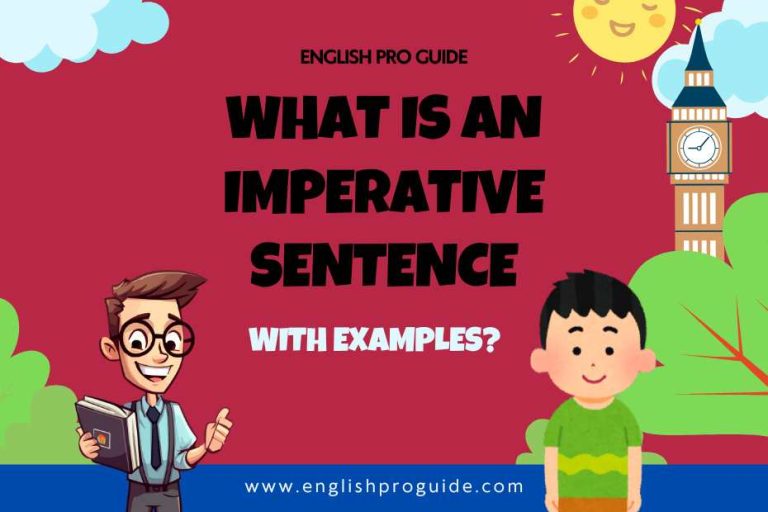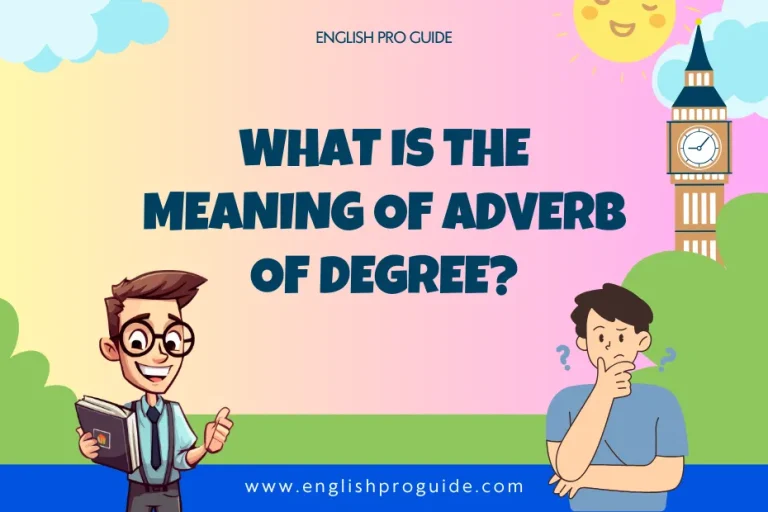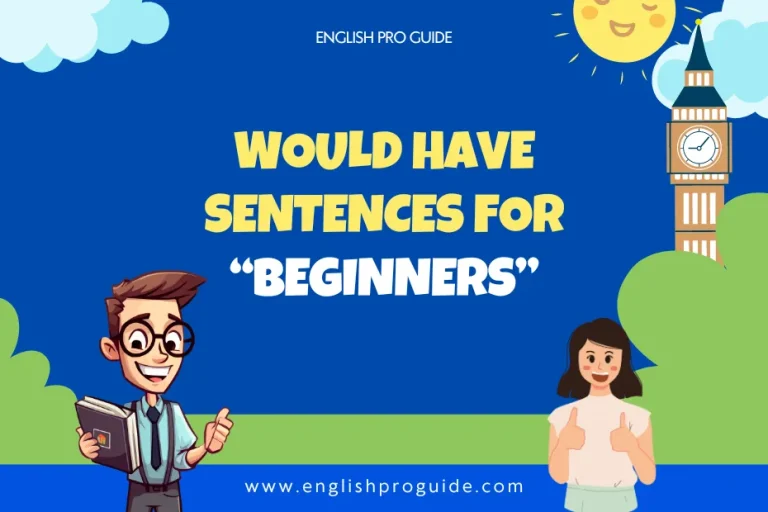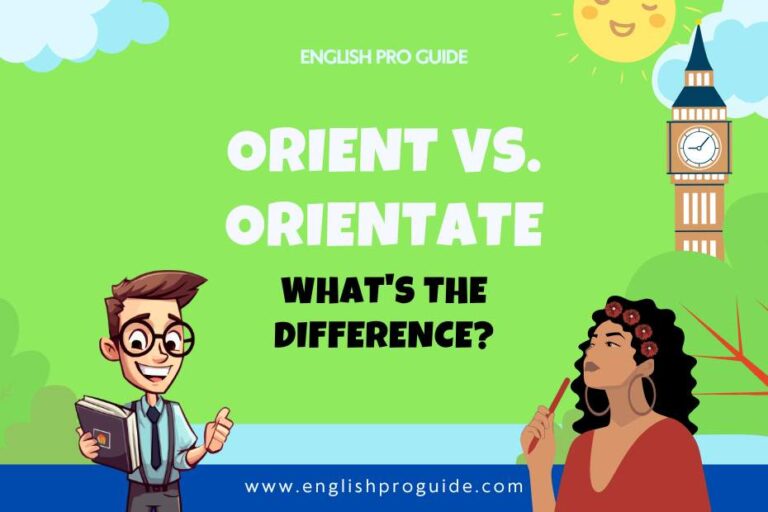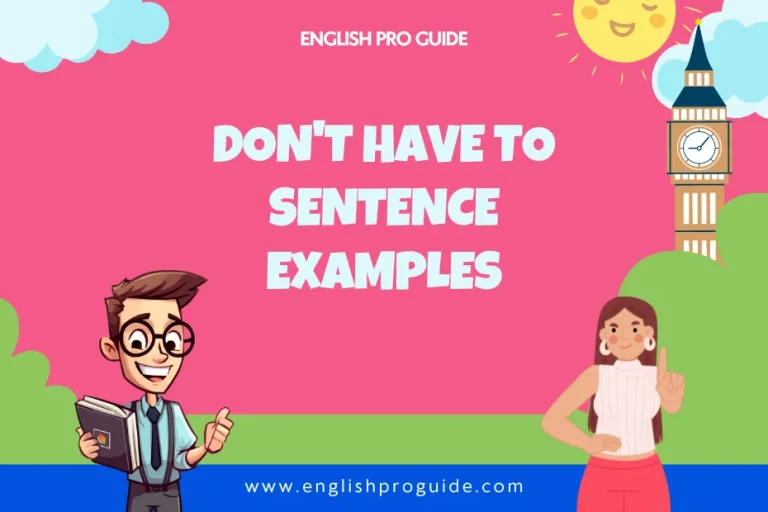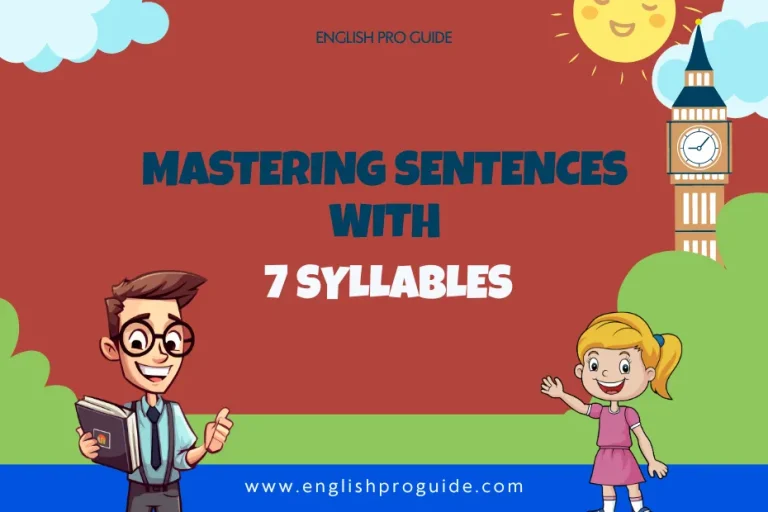Can You Start A Sentence With The Word If? With 100 Examples
Hey, young writers! Have you ever wanted to start a sentence with the word if? Guess what? You totally can! But there’s a little trick to it. Let me show you how it works!
What Happens When You Use “If” at the Start?
When you start a sentence with the word if, it’s usually because you’re talking about something that might happen—like a possibility.
But here’s the important thing: You need to finish the thought! A sentence that starts with if needs to be completed so it makes sense.
Example:
If you finish your homework, we can go to the park.
See how that works? You start with if, but you need to tell what will happen afterward.
Can You Start A Sentence With The Word If?
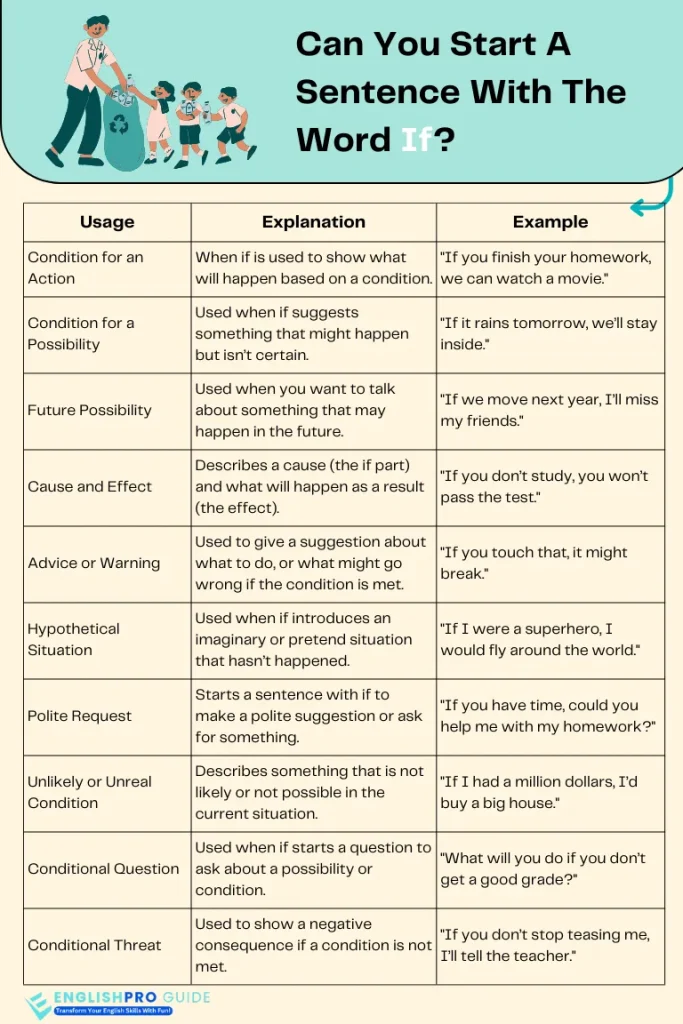
Here I made a table for you to understand when to use “If”
Can You Start A Sentence With The Word If? See When You Can
| Usage | Explanation | Example |
|---|---|---|
| Condition for an Action | When if is used to show what will happen based on a condition. | “If you finish your homework, we can watch a movie.” |
| Condition for a Possibility | Used when if suggests something that might happen but isn’t certain. | “If it rains tomorrow, we’ll stay inside.” |
| Future Possibility | Used when you want to talk about something that may happen in the future. | “If we move next year, I’ll miss my friends.” |
| Cause and Effect | Describes a cause (the if part) and what will happen as a result (the effect). | “If you don’t study, you won’t pass the test.” |
| Advice or Warning | Used to give a suggestion about what to do, or what might go wrong if the condition is met. | “If you touch that, it might break.” |
| Hypothetical Situation | Used when if introduces an imaginary or pretend situation that hasn’t happened. | “If I were a superhero, I would fly around the world.” |
| Polite Request | Starts a sentence with if to make a polite suggestion or ask for something. | “If you have time, could you help me with my homework?” |
| Unlikely or Unreal Condition | Describes something that is not likely or not possible in the current situation. | “If I had a million dollars, I’d buy a big house.” |
| Conditional Question | Used when if starts a question to ask about a possibility or condition. | “What will you do if you don’t get a good grade?” |
| Conditional Threat | Used to show a negative consequence if a condition is not met. | “If you don’t stop teasing me, I’ll tell the teacher.” |
This table breaks down the various ways “if” can be used to start sentences, helping you to understand different types of conditional statements.
Think of If as a Big Question
When you begin a sentence with if, you’re kind of asking a big question. You’re saying, “What will happen if I do this?” or “What happens if this thing is true?” But you need to answer that question in the same sentence.
Examples:
- If it rains, we will stay inside.
- If you practice piano every day, you will get better at it.
In each sentence, if introduces the possibility, and the rest of the sentence explains what happens next.
Important Rule!
When you use if at the beginning of a sentence, don’t forget a comma! A comma comes right after the first part of the sentence to separate the “if” part from the rest.
Here’s a little trick to remember:
- If + condition, + result.
Example:
- If you eat your vegetables, you’ll grow big and strong.
Let’s Try It Out!
Activity 1: Complete the Sentence!
Here are some sentences that start with if. Can you finish them?
- If you study hard, _________.
- If it snows tomorrow, _________.
- If you wake up early, _________.
Possible Answers, you can make yours.
- If you study hard, you will get good grades.
- If it snows tomorrow, we can build a snowman.
- If you wake up early, you’ll have more time to play.
Read More: Combining Sentences Using Subordinating Conjunctions
100 Sentences With If – In categorized Format
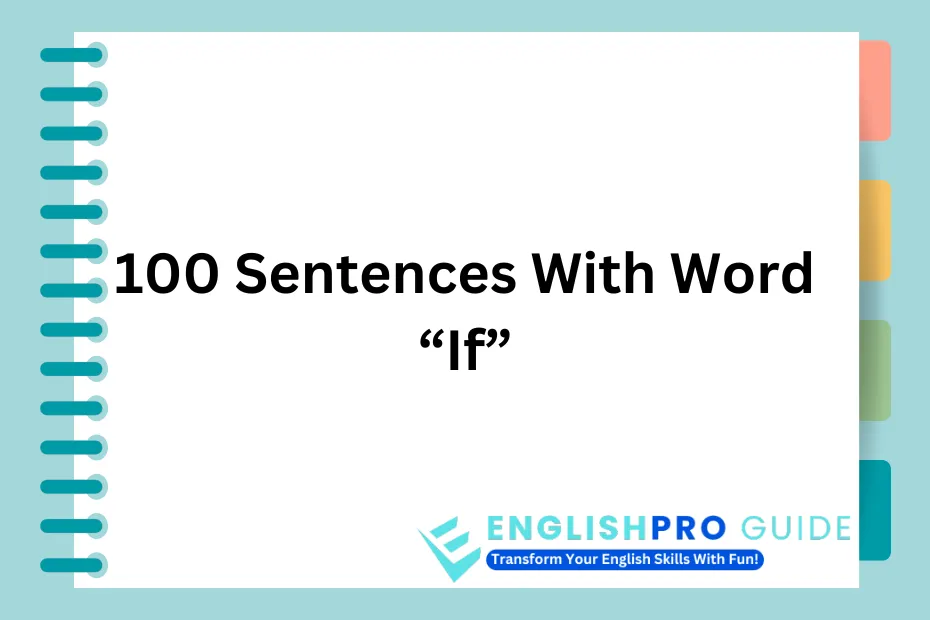
Here’s a categorized list of 100 sentences that start with if, to demonstrate the different ways “if” can be used.
1. Condition for an Action
Sentences that show what will happen based on a condition.
- If you eat your vegetables, you will get dessert.
- If you study hard, you’ll pass the test.
- If you practice every day, you will improve.
- If you wear your coat, you won’t be cold.
- If you finish your chores, you can go play outside.
- If you clean your room, you can watch TV.
- If you stay up late, you’ll be tired tomorrow.
- If you do your homework, you can go to the party.
- If you follow the rules, you won’t get in trouble.
- If you ask nicely, they might help you.
2. Condition for a Possibility
Sentences that suggest something might happen but isn’t certain.
- If it rains, we’ll stay inside.
- If you miss the bus, you’ll have to walk.
- If the power goes out, we’ll use candles.
- If the store is closed, we’ll go tomorrow.
- If the movie is sold out, we’ll see another one.
- If you get lost, call me.
- If it’s too hot, we’ll go swimming.
- If the game is canceled, we’ll play at home.
- If you’re not sure, ask the teacher.
- If the computer breaks, we’ll need to fix it.
3. Future Possibility
Sentences that talk about what may happen in the future.
- If we move, I’ll miss my friends.
- If you grow taller, you’ll be able to reach the top shelf.
- If I get a job, I’ll save up for a bike.
- If we go on vacation, we’ll visit the beach.
- If you keep working hard, you’ll achieve your goals.
- If we win the game, we’ll celebrate.
- If the weather is nice, we’ll have a picnic.
- If you learn to swim, we can go to the pool.
- If you join the team, you’ll make new friends.
- If you practice the piano, you’ll play a song at the recital.
4. Cause and Effect
Sentences that describe a cause and what will happen as a result.
- If you touch the stove, you will get burned.
- If you don’t water the plants, they will die.
- If you exercise regularly, you will stay healthy.
- If you leave the door open, the dog will get out.
- If you forget your umbrella, you’ll get wet.
- If you lie, people won’t trust you.
- If you eat too much candy, you’ll get a stomach ache.
- If you break the rules, there will be consequences.
- If you rush, you might make mistakes.
- If you drive too fast, you could get a ticket.
5. Advice or Warning
Sentences that give suggestions about what to do, or warn about possible negative outcomes.
- If you’re cold, put on a sweater.
- If you’re hungry, grab a snack.
- If you don’t hurry, you’ll miss the bus.
- If you’re tired, take a nap.
- If you’re lost, ask for directions.
- If you’re feeling sick, stay home from school.
- If you can’t find it, retrace your steps.
- If you don’t lock the door, someone could get in.
- If you don’t read the instructions, you might do it wrong.
- If you drop your phone, it might break.
6. Hypothetical Situations
Sentences that introduce imaginary or pretend situations.
- If I were a bird, I would fly to the highest mountain.
- If I had a pet dragon, I’d ride it to school.
- If I lived in space, I’d bounce around all day.
- If I had a million dollars, I would travel the world.
- If I could talk to animals, I’d ask them about their day.
- If I were invisible, I’d sneak into the movies for free.
- If I had superpowers, I’d save the world.
- If I were a fish, I’d swim in the deepest ocean.
- If I were a king, I’d build a castle.
- If I could be anyone, I’d be an astronaut.
7. Polite Requests
Sentences that use “if” to make a polite suggestion or ask for something.
- If you have time, could you help me with my project?
- If it’s not too much trouble, could you pass the salt?
- If you don’t mind, can I borrow your pencil?
- If you’re free later, would you like to hang out?
- If you see my book, can you let me know?
- If it’s okay with you, can I sit here?
- If you’re going to the store, could you get some milk?
- If you have a moment, can we talk?
- If you’re available, can you meet me after school?
- If you don’t need this, can I take it?
8. Unlikely or Unreal Conditions
Sentences that describe conditions that are not likely or not possible.
- If I were the president, I’d make weekends longer.
- If I could fly, I’d never need a car.
- If I had three wishes, I’d wish for unlimited candy.
- If I lived on the moon, I’d have the best view of Earth.
- If I could turn back time, I’d fix my mistakes.
- If I knew how to teleport, I’d visit every country in the world.
- If I had magic powers, I’d turn my room into a castle.
- If I could time travel, I’d go see the dinosaurs.
- If I were a superhero, I’d protect the city from villains.
- If I could live anywhere, I’d choose a tropical island.
9. Conditional Questions
Sentences that use “if” to ask about possibilities or conditions.
- What will you do if it rains tomorrow?
- If you could have any pet, what would it be?
- If you could be any animal, which one would you choose?
- What will happen if you don’t finish your homework?
- If you could go anywhere on vacation, where would you go?
- What would you eat if you could have anything for dinner?
- If you could meet anyone in history, who would it be?
- What will you do if your friend doesn’t show up?
- If you could change one thing about your school, what would it be?
- If you had to choose one superpower, what would it be?
10. Conditional Threats
Sentences that show a negative consequence if a condition is not met.
- If you don’t clean your room, you can’t go out.
- If you keep arguing, you’ll be sent to your room.
- If you don’t stop yelling, you’ll lose your privilege to play.
- If you don’t share your toys, we’ll take them away.
- If you don’t eat your dinner, no dessert for you.
- If you don’t do your homework, you’ll be grounded.
- If you’re late again, you’ll miss the fun.
- If you touch that, you’ll break it.
- If you don’t listen, there will be consequences.
- If you don’t behave, we’ll leave early.
These sentences demonstrate different ways to use “if” in everyday conversations, organized by category to help you understand the various uses of conditional statements.
The End
See how easy it is to start a sentence with if? Just remember to finish your thought, and you’ll be all set!
Now you know the secret! Starting a sentence with if is not only possible, it’s a great way to create interesting and fun sentences. Just make sure to complete your idea, and you’re good to go!

